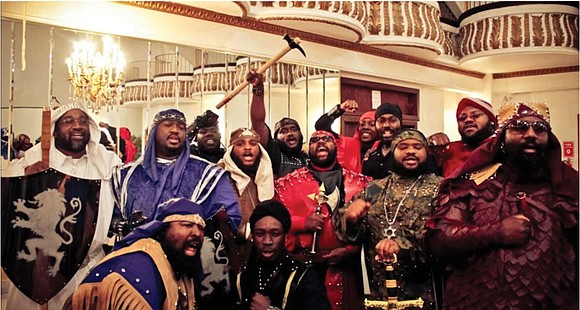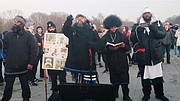Who are the Black Hebrew Israelites?
Jack Jenkins/Religion News Service | 12/20/2019, 6 a.m.
On Dec. 10, two individuals opened fire on a kosher supermarket in Jersey City, N.J. The violent attack — which occurred shortly after the assailants allegedly killed a police officer in a nearby cemetery — ultimately left three bystanders dead and three people wounded, including two police officers.
Law enforcement authorities later announced they are treating the incident as a case of domestic terrorism and said the suspects, both of whom were killed in a shootout with police, were “fueled both by anti-Semitism and anti-law enforcement beliefs.”
Officials also noted that one of the suspects had posted anti-Semitic comments online and had ties with the Black Hebrew Israelite movement, a category that includes organizations labeled as hate groups and members who have voiced beliefs widely seen as anti-Semitic.
But just who are the Black Hebrew Israelites?
According to Dr. Judith Weisenfeld, chair of the Department of Religion at Princeton University, the short answer is: It depends.
“There’s no such thing as ‘the’ Black Hebrew Israelites,” Dr. Weisenfeld, author of “New World A-Coming: Black Religion and Racial Identity During the Great Migration,” told Religion News Service. “There are lots of different theological and political orientations within that broader umbrella.”
The movement, which typically does not associate itself with mainstream Judaism, has a long history in the United States and has exhibited a variety of permutations. At the most basic level, members are loosely bound together by a common claim that they are affiliated with the Twelve Tribes of Israel mentioned in the Bible.
But within that community, there is much diversity. Dr. Weisenfeld pointed to at least two different strains of the Black Hebrew Israelite movement that have evolved over time. The first developed during a period that stretched from the late 19th century and into the 1920s, when a group of black worshippers emerged who believed that slavery and bondage had “forced a Christian and Negro identity on them” that was false.
“They were saying that ‘the Negro’ is a product of enslavement and an invention of white people, and Christianity is not ours,” she said. “So some people in this period turn to the Bible and say, ‘There it is: We were actually of the lost tribes (of Israel).’ ”
These groups tended to reject racial categories ascribed to them in the United States. Some wrote in alternative racial identities — including “Hebrew” — on draft cards during World War II.
Communities associated with this iteration of the Black Hebrew Israelite movement — or at least connected to it — still exist, including Beth Shalom B’nai Zaken Ethiopian Hebrew Congregation in Chicago. That congregation is led by Rabbi Capers Funnye, who is former First Lady Michelle Obama’s cousin and has been called “Obama’s Rabbi.” A prominent figure in the Black Hebrew Israelite movement, The Forward once touted him as someone who could potentially move the movement “closer to the center of mainstream Jewish life.”
Dr. Jacob Dorman, professor at the University of Nevada, Reno, and author of “Chosen People: The Rise of American Black Israelite Religions,” argues for even further nuance, insisting this wing of the movement can be delineated into two separate “waves.”
But both he and Dr. Weisenfeld agree that a new iteration emerged in the 1960s and 1970s. “(These groups) rejected the term ‘Jew’ and emphasized the illegitimacy of white Jews as part of a style that was militant, black nationalist, macho and patriarchal, frequently focused (on) emigration, whether to rural communities in the South, or, in one case, to Liberia and then Dimona, Israel,” Dr. Dorman told RNS in an email.
He added that these groups are often characterized by a preference for “confrontational” street preaching and have produced “messianic leaders and, on occasion, criminal conspiracies.”
The beliefs and practices have caused divisions within the broader Black Hebrew Israelite community.
“The older groups tend to disagree with both the content and the style of the newer groups,” Dr. Dorman said. “There is also fighting and factionalism amongst third wave Israelite groups. These movements are very schismatic.”
Rabbi Funnye told RNS in January that he objects to some of these groups even using the term Hebrew Israelites and criticized some of their street preaching practices.
“I can assure you that we have nothing to do with this group whatsoever, in any way, shape, form or fashion,” he said at the time.
This more recent wave also has caught the eye of the Southern Poverty Law Center, which tracks hate groups. The SPLC has labeled 144 Black Hebrew Israelite organizations — but by no means all — as hate groups on its website. It cites evidence of what experts call “a rising extremist sector within the movement” due to the “antisemitic and racist beliefs” of some Black Hebrew Israelite groups.
Dr. Dorman argued for a nuanced understanding of the groups, stating SPLC’s approach is “highly problematic from a scholarly perspective, as it takes public statements at face value.”
Even so, Black Hebrew Israelites have drawn national attention in recent years for wading into national political discourse. A group affiliated with the movement was seen hurling insults at a group of Covington Catholic students in January 2019 for wearing hats emblazoned with President Trump’s campaign slogan “Make America Great Again.”
Meanwhile, Michael Symonette, a man often seen at Trump rallies waving a “Blacks for Trump” sign, also reportedly is connected to the movement, according to The Forward. His own views appear to deviate from any of the main Black Hebrew Israelite strains: He sees Ashkenazi Jews as “blessed people,” Sephardic Jews as “false Jews” who “hate the blessed people,” and black and white people as the “real Hebrews.”
The exact nature of the connection between the Jersey City gunman and the Black Hebrew Israelites remains unclear, although the SPLC noted that “anti-law enforcement sentiment is not a core tenet of the Black Hebrew Israelite ideology.”









